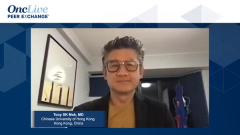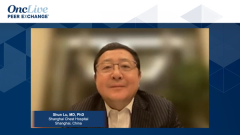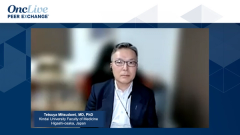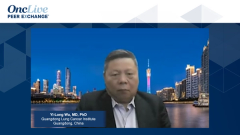
EGFR+ Advanced NSCLC: Review of Bevacizumab-Based Combination Therapy
Experts review frontline combination approaches with bevacizumab in EGFR+ advanced non–small cell lung cancer.
Episodes in this series

Transcript:
Tony S.K. Mok, MD: Let’s focus a little bit about another combination, chemotherapy plus bevacizumab. Do you ever use it? Do you think it’s advantageous to use it? Consider the fact that there are 3 randomized studies of progression-free survival now—2 are bevacizumab, 1 is ramucirumab.
Shun Lu, MD, PhD: Although we have 2 or 3 studies to confirm that EGFR prolong the progression-free survival, but for the overall survival, no difference. So I will not routinely use this combination. I will only use a monotherapy. But some doctors in China are using this combination, especially for the H5/L8 mutation patients.
Tony S.K. Mok, MD: This year, there is a booster study from [INAUDIBLE] that actually demonstrated no benefit overall. But then in the subgroup of patients who are smokers there’s additional benefit. Do you believe that is the case or is there any additional rationale why a smoker may be actually better off with this combination?
Shun Lu, MD, PhD: A smoker, I don’t think that it can really change my practice. We needed to know that for the smoker, it may be more…they have a lot of the different mutations. With the basic biology, that’s not only just a smoking status can predict TKI [tyrosine kinase inhibitor] effects. So maybe there are concurrent or different mutations in heavy smoker patients.
Tony S.K. Mok, MD: Tetsuya, any opinion on that? Why TKI plus bevacizumab may have the benefit over in the smoking population?
Tetsuya Mitsudomi, MD, PhD: I have no idea. Is that osimertinib plus bevacizumab right?
Tony S.K. Mok, MD: Yes, that’s correct. That is the process.
Tetsuya Mitsudomi, MD, PhD: In general, I would be wondering why the combination with osimertinib is not as good as the combination with erlotinib. In the ESMO [European Society for Medical Oncology] meeting, [INAUDIBLE] present the data with the first-line osimertinib plus bevacizumab. It’s a randomized phase 2, but there’s no difference points between the 2 arms in terms of the PFS [progression-free survival]. In general, osimertinib and bevacizumab have a very nice separation of the PFS, although there’s no OS [overall survival] advantage. So why erlotinib is good but osimertinib is not good? So that’s my question.
Tony S.K. Mok, MD: There’s also 1 suggestion from the booster study is that they also looked into the TP53 [mutation] because they’re smoker, [and they] tend to have a high instance of TP53. So the question is that is the TP53-positive ones are the subgroup that may benefit from the combination of TKI and bevacizumab?
Tetsuya Mitsudomi, MD, PhD: Right. I think that’s an attractive hypothesis. But [the] REALIST study also populated a similar subset analysis, but I don’t see that clear evidence that TP53 mutation will predict the benefit of the ramucirumab in that case. We should stay tuned, but so far we don’t have that definitive answer whether the TP53 mutation can be the predictor for, or indicate that for the bevacizumab or ramucirumab.
Myung-Ju Ahn, MD: Actually, the RELAY data, the subgroup analysis with TP53, the erlotinib plus bevacizumab can benefit in those patients with TP53.
Tetsuya Mitsudomi, MD, PhD: But if you see, look at [it] very closely, that effect is different between the 19 and [INAUDIBLE]. So that’s the very difficult part.
Myung-Ju Ahn, MD: I know [CROSSTALK].
Tetsuya Mitsudomi, MD, PhD: Yeah. So as I said to you, it’s very attractive, but we don’t know the exact answer yet.
Transcript edited for clarity.












































